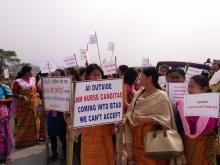Today marks the completion of 15 years of the selfless and unparalleled protest of Irom Sharmila, 42 year old poet and human rights defender from Manipur, India. She has been on hunger strike since 2 November2000, demanding the repeal of the draconian Armed Forces (Special Powers) Act (AFSPA) which has been criticized by several national and international bodies. The Asian Forum for Human Rights and Development (FORUM-ASIA), Human Rights Alert (Manipur), Amnesty International India and Naga People’s Movement for Human Rights urge Indian authorities to immediately and unconditionally release Irom Sharmila and repeal AFSPA.
“Irom Sharmila’s 15 year hunger strike is a symbol of a brave struggle against injustice. The AFSPA has caused widespread human rights violations like enforced disappearances, extrajudicial executions, torture and sexual violence,” said Henri Tiphagne, Chairperson of FORUM-ASIA. In particular, “AFSPA has been used to justify killings on mere suspicion as well as granted virtual immunity through a clause prohibiting legal proceedings without sanction from the federal government, which is virtually never granted.”
Irom Sharmila started her hunger strike on 2 November 2000 demanding the repeal of AFSPA. However she was arrested four days later and charged with attempted suicide, a crime under Section 309 of the Indian Penal Code. “According to Section 309, a person convicted of the crime of attempted suicide may only be imprisoned a year. Since then Sharmila has been arrested, released and rearrested to be released after a year of judicial custody where she is forced fed through a nasogastric tube,” said Babloo Loitongbam, Director of Human Rights Alert Manipur. “Sharmila has never been convicted of charges of attempted suicide. Sharmila has repeatedly rejected the allegation that she is trying to commit suicide and maintains that she is on hunger strike demanding the repeal of AFSPA”.
On 19 August 2014, a Manipur court ordered Sharmila to be released stating that her hunger strike was a "political demand through lawful means". On 10 December 2014, the Indian Ministry of Home Affairs said the Indian government had decided to repeal section 309 which would decriminalize attempted suicide. Most recently, on 23 January 2015, a district court in Imphal rejected the charges of attempted suicide and ordered to Sharmila’s release from custody. However, she was re-arrested on the very same charges a day later. Sharmila has been facing this farcical cycle of arrests and re-arrest and has been subjected to force feeding since she began her hunger strike in November 2000.
"A hunger strike is not an attempt at suicide. Irom Sharmila is being detained by the government only for her inconvenient activism,” said Aakar Patel Executive Director of Amnesty International India. “She is a prisoner of conscience, using her freedom of expression to protest against an unjust law. And her shameful detention leaves a stain on India's commitment to human rights which grows harder to remove with every passing year."
The criminalization of Irom Sharmila’s peaceful protest also goes against the spirit of Article 1 of the UN Declaration on Human Rights Defenders, which guarantees the right of human rights defenders to promote and protect the realisation of human rights.
Despite repeated calls to withdraw the AFSPA from UN experts as well as national and international groups, the Act continues to be enforced and continues to cause flagrant human rights violations. During the then UN High Commissioner for Human Rights Navanethem Pillay’s visit to India in March 2009, she said the Act breached “contemporary international human rights standards.” Furthermore, Margaret Sekaggya, then UN Special Rapporteur on Human Rights Defenders in 2011 and also Christof Heyns, then UN Special Rapporteur on Extrajudicial, Summary or Arbitrary executions in early 2012, had recommended repeal of AFSPA. During the second cycle of the Universal Periodic Review in 2012, India also received specific recommendations to review and repeal AFSPA. However, these recommendations were ignored as India was reluctant to accept them.
Earlier this year, the Indian government-appointed High Level Committee on the Status of Women recommended repealing AFSPA. Previously, several other government-appointed commissions have recommended repealing the lawThe Justice Jeevan Reddy Committee, the Second Administrative Reforms Commission and the Prime Minister’s Working Group on Confidence-Building Measures in Jammu and Kashmir have recommended the repeal of the AFSPA. The Justice Verma Committee, set up in 2012 to review laws against sexual assault, noted that AFSPA legitimizes impunity for sexual violence. The Justice Santosh Hegde Commission, set up by the Supreme Court in 2013 to investigate cases of extrajudicial executions in Manipur, described its findings as “egregious examples of the AFSPA’s gross abuse.”
FORUM-ASIA, Human Rights Alert (Manipur), Amnesty International India and Naga People’s Movement for Human Rights urge the Indian government to take immediate measures to repeal AFSPA given that is not in accordance with the international human rights standards. Repeal of AFSPA is already much delayed.






Add new comment